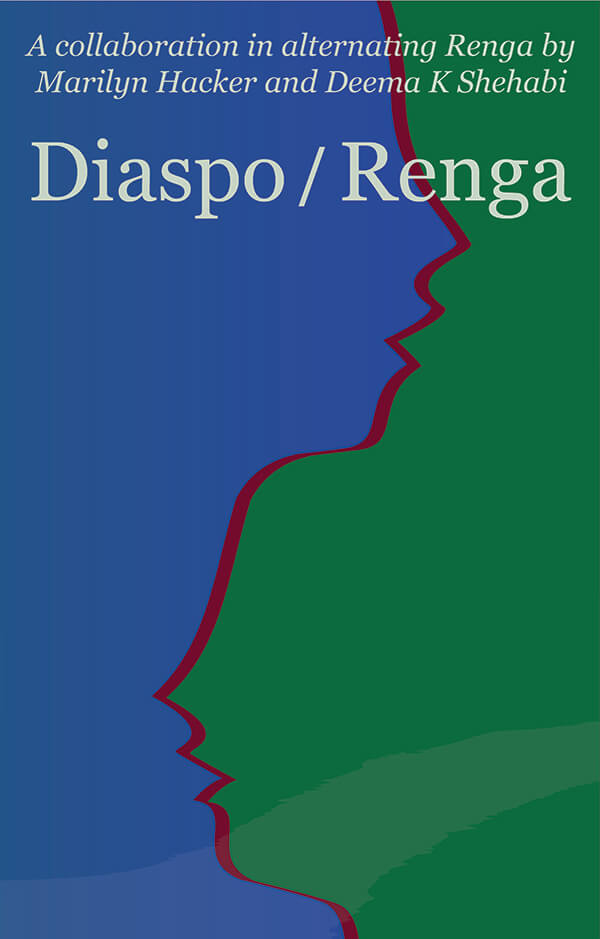‘The script leaps across /the page to smack /your lips’: the sprung rhythms of Diasporenga startle and enchant the ear, as its stories of emigration and exile have the mind leaping between continents. This book’s revolutionary form is most revolutionary of all in making serious political engagement and sophisticated poetic pleasure inseparable. — Fiona Sampson, Professor of Poetry, University of Roehampton Peace grows from the interweaving of voices, and it’s hard to imagine two more aware and unmistakable poetic voices on the subject of peace in the Middle East than these: Hacker and Shehabi, two brilliant witnesses, one unswerving and crystalline, the other infused with memory and dream. This is a book to savor and to meditate on— and, finally, to exult in. — Annie Finch Poets, if asked ‘What is poetry for?’ often find themselves stumped for an answer. In this stunning sequence of renga, Marilyn Hacker and Deema Shehabi, have given us more than one. Poetry travels the globe, from Gaza to Syria, Beirut to California, brings each place to life, its people, stories, moments behind locked doors, while bringing them under one roof, the roof of the imagination. Poetry invokes the power of memory, of naming, by listening as much as speaking, by keeping the windows of the heart open in conversation. Poetry evokes landscapes of loss in a ruptured world, bridges differences, respects binaries, and yet still suggests a sense of oneness, of humanity, still celebrates the human spirit while mourning one wound, one world. We celebrate these two voices, bleeding in and out of each other, quicksilver, mercurial, eloquent in song and in silence. — Mimi Khalvati ‘These poets piece together the exact same shattered mirrors of identities that are the shrapnel of our ever-worsening global conflicts.’ ‘Written continents apart, Diaspo/Renga reads like one story, a story that challenges divisive notions, a story that contains scenes to which we all have an equal claim.’ — Shadab Zeest Hashmi on 3 Quarks Daily ‘bringing to readers a great cast of characters whose voices clamour to be heard. A very successful poetic experiment.’ — Banipal 51 ‘The book is not only a dialogue between the two poets, but also between the present and the past. The poets deal with these difficult human issues by tapping the wisdom of classical and modern masters, their poetry a collective eternal text written by all poets everywhere.’ — Miled Faiza in Al-Jadid ‘In true renga form, each piece carries on a theme or image from the previous poem, creating a continuous dialogue rich in language and meaning.’ — World Literature Today ‘The sequences of ten-line poems in alternating three- and twoline stanzas imagine the personae of dozens of victims of violence and displacement.’ — Moira Richards in Wasafiri ‘What a beautiful unique book! The poems are descriptive and full of life and emotions!’ — Maram Bata on Amazon ‘In it the two voices blend in and out of one another, picking up a word, an image, a line, from the poem preceding.’ — Kenyon Review ‘I have long followed Hacker’s work and admired her poetry. To add Shehabi’s voice to this global endeavor raises the bar several more notches, and reinforces and strengthens the power of the collection as a whole.’ ‘As our planet turns, as we are more and more steeped in violence, voices like Hacker’s and Shehabi’s are essential.’ — Marilyn Krysl on Women Write the Rockies ‘Diaspo/Renga dramatizes how Jewish and Palestinian experiences of exile (the diaspo(ra) of the title) come together in an act of imaginative empathy for and solidarity with oppressed and displaced peoples. The book’s intriguing origins speak to the possibilities of solidarity in a digital age.’ — Philip Metres in On the Seawall ‘The poems tell stories of exile, war, and loss, without ever letting go of day-to-day details, like someone singing Frank Sinatra, and someone else watching videos of Grease between blackouts.’ — Zeina Hashem Beck in The Common

